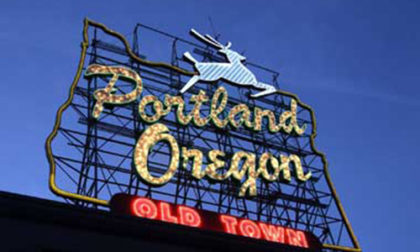Portland, Oregon Poker Scene Faces Looming Legislative Crackdown
The thriving “private club” poker scene in Portland and elsewhere in Oregon continues to face a virtual shutdown as legislation designed to ensure the enforcement of certain gaming regulations advances through the state’s legislature. On Wednesday, the Oregon House of Representatives passed House Bill 2190, a bill which directly targets the future of Oregon’s 20 or so quasi-legal poker rooms.
The not-quite-private Oregon rooms, more than three quarters of which are in the metro Portland area, have been a growing target of law enforcement officials, legislators, and across-the-Washington-border gambling competition. HB 2190, the purpose of which is to “Modif[y the] definition of “social game” [meaning poker] for purposes of regulation of gambling.”
HB 2190 passed on Wednesday by a 41-14 margin, with five non-votes, which moves the measure on the Oregon State Senate. The bill’s passage came little more than a week after it cleared the Oregon House’s Business and Labor Committee on an 8-0-1-0 vote.
As for what’s contained in the bill, that’s where it gets interesting. Oregon law allows for private clubs to host social-gaming events, with the provisions that such events are non-profit and for low stakes: Any wager over a dollar is a technical violation of the state’s social-gaming codes.
However, social-gaming licenses are freely issued, in Portland and other municipalities in Orgeon, and authorities have long looked the other way, since poker and gambling is a low priority. The clubs have operated and — at least for the short term — as technically being private by charging an entry or cover fee, and by not charging rake or administrative fees on the actual poker play.
And the dealers? Well, they’ve worked for tips, officially, and that’s one of the problems the clubs face. Dealers can volunteer such services, but they can’t do it for a for-proft enterprise, as all these Oregon poker roms surely are.
The size of the stakes is surprisingly large as well. This feature that appeared last month at Willamette Week tells the story of one of the Portland poker scene’s most successful poker entrepreneurs, Evgeny “John” Ogai. Ogai opened what was perhaps the most successful Portland poker club of all, Encore, back in 2010, but it was perhaps too successful. Ogain and Encore eventually hosted tourneys offering six-figure prize pools.
Collectively, the Portland rooms damaged the revenue streams of some of the legal rooms across the Columbia River, in Washington State, and those rooms and casinos did more than just complain; they sued. When the suits weren’t successful, they complained to the IRS, and unhappy dealers complained as well. One of those dealers filed a complaint about Ogai and Encore in 2015 with the Oregon Bureau of Labor and Industries (BOLI). Ogai’s Encore was shut down in early 2016, and Ogai himself, just 38, committed suicide last August.
At that point the legal spotlight was on all of the Oregon poker rooms, who were indeed licensed to operate but certainly weren’t following the strict rules on the books. Four more Portland-area rooms received suspension notices last December after undercover investigators confirmed their use of professional dealers, again in violation of the state’s social-gaming codes. Two of the four rooms accepted the temporary shutdown; the other two are fighting an uphill court battle.
And that led directly to HB 2190, which was introduced in January. The bill’s aims are not only to enforce the already-existing ban on paid dealers (whether in tips or through other means). Even more important, HB 2190 would end the “private club” category for legal social gambling, and instead, as many other states in the US already do, allow such gambling only in connection with licensed charitable causes.
A legislative overview attached to HB 2190 offers this background overview:
Cities and counties have had statutory authority to adopt ordinances allowing social games to be played in private businesses, private clubs, and places of public accommodation since 1974. As defined in Oregon statutes, a social game is a game between players in a private home where no house player, house bank or house odds exist and where there is no house income from the operation of the social game; additionally, if authorized by a city or county, social games can take place in a private business, private club or place of public accommodation. Social games are not considered gambling for purposes of enforcing gambling laws.
The Bureau of Labor and Industries (BOLI) issued a ruling in 2015 against a Portland poker club for violating minimum wage and record keeping requirements. One or more persons volunteered to serve as a poker dealer, but BOLI ruled that people cannot volunteer their services for private, for-profit employers. The City of Portland issued enforcement letters in December 2016 to four poker clubs for violating the dealer-player requirement.
House Bill 2190 limits cities and counties to authorizing the playing of social games on premises operated and controlled by charitable, fraternal and religious organizations. For-profit, private businesses and clubs may no longer allow social games to be played on their premises. There continues to be the ability to play social games in private homes.
In other words, when HB 2190 becomes law — and it’s going to — the poker-club scene in Portland will be all but finished, existing only underground if at all. The timeline for Senate consideration of the bill is unclear; it could be anywhere from a few weeks to a few months.
More clear, though, is that the thriving poker scene in Portland appears about to hit a legal wall. The area’s poker players soon will be traveling much longer distances in search of a good game.




















COMMENTS